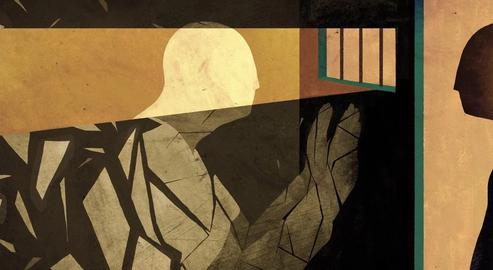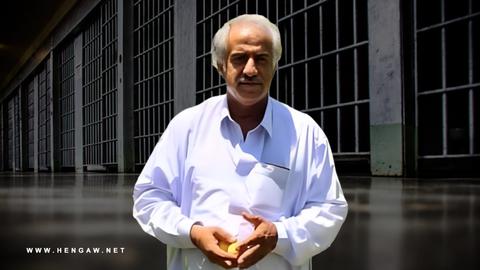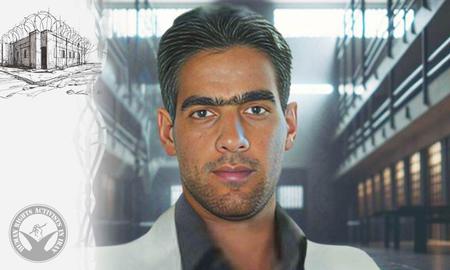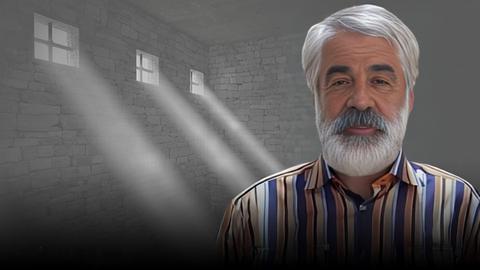In a country like the Islamic Republic of Iran it’s no surprise to anyone if you go to prison after criticizing or protesting against some aspect or other of its governance. The country's prisons are full of people facing several years’ incarceration for this innocuous act. Perhaps worse, though, is the extent of abuse they could be subjected to along the way: including in the form of supplementary punishments issued by the Revolutionary Court. In the last nine months alone, at least five critics of the government have been sentenced by Branch 26 of the Tehran Revolutionary Court to take “emotional and psychological control” courses: a punishment that takes aim not at prisoners’ bodies, but their mental health.
***
Judge Iman Afshari became the head of Branch 26 of the Revolutionary Court of Tehran Province in the winter of 2018. This particular institution, together with Branches 15 and 28, are referred to collectively as the “three branches of repression” against critics of the Islamic Republic.
According to a review by the Atlas of Iranian Prisoners, Judge Afshari has issued at least 116 sentences to supposedly regime-critical individuals including artists, journalists, writers, political, civil, trade union, religious, and other activists.
Looking at the sentences, convicts in addition to imprisonment, fines and even flogging, it’s obvious Afshari is very interested in meting out "supplementary punishments" to those he convicts. Before February 2021, these extra penalties included such things as a ban on the use of smart electronic devices, travel bans, and internal exile.
Then in February 2021, Banafsheh Jamali, a media and women's rights activist, was sentenced by the same judge to one year in prison for so-called "propaganda against the regime". Afshari suspended Ms. Jamali’s sentence for five years but instead, she was sentenced to pay a four million-toman fine, a ban on using smart devices and a ban on leaving Iran. There was also a new punishment: Ms. Jamali was ordered to attend “emotional and psychological control counseling at the Mava Institute in Qom".
This was the beginning of a new wave of supplementary punishments issued by in Branch 26 of the Revolutionary Court of Tehran. In June 2021, Zia Nabavi, a student activist and former political prisoner, was sentenced to one year in prison for "propaganda activities against the regime." He was also banned from leaving the country for two years and made to attend a set of sessions at the Mava Institute.
The very next day on June 30, Mehdi Salimi, a writer and translator, announced on Instagram that Judge Afshari had sentenced him to a suspended two years and six months in prison, barred him from of membership in any political and social parties and groups, and ordered him to undergo additional “study of human lifestyle issues” and attend the meetings of the Mava Institute. He was also told to write a 120-page manuscript with a focus on the “cognitive analysis of religious modernism and divergent thought”, in coordination with the Ministry of Culture and Islamic Guidance.
Majid Rezaei, a civil activist, was sentenced to nine months in prison and meetings at the Mava Institute by Judge Afshari in September 2021. He also had to do four hours of community service per day as a street cleaner for three months, under the supervision of the Tehran Municipality. Rezaei had been accused of "propaganda against the regime" for his peaceful civic activities.
In the final case, in November 2021, Kamyar Fakoor, a journalist and rapper arrested during Iran’s recent workers’ protests, received a similar punishment from the same branch. Judge Afshari sentenced Fakoor to eight months in prison, 50 lashes and a fine of 15 million tomans. These sentences were suspended for five years, subject to his attending the Mava Institute and not leaving the country without permission or using social media.
What do we Know About the Mava Institute?
The Mava Institute, also known as the Mava Counseling Center, was established in 1999 in Qom with the original purpose of supporting people with mental health issues. Its services, according to the website, include the treatment of specific disorders, couples’ therapy, counseling for children and adolescents, premarital counseling and “psychometric services” like intelligence testing, assessment of mental health status and assessment of personality traits.
Mava is funded by the Imam Khomeini Educational and Research Institute, which is run under the direct supervision of Ali Khamenei, the leader of the Islamic Republic, and until last December was headed by influential Shia cleric Ayatollah Mohammad Taghi Mesbah Yazdi. It allocated 20 billion tomans (US$688,942) to Mava in 2020 and 29 billion tomans (almost $1m) in 2021.
Is the Judge a Psychologist?
Judge Afshari’s personal interest in the Mava Institute is not clear. Investigation of the records by IranWire’s sister website Journalism is Not a Crime established it was not just the five people mentioned above who were referred to the counseling center by the court: there have been others since February. We also heard that the center’s specialists aren’t too happy with the arrangement.
One of the political convicts who was made to go to the Mava Counseling Center by judge Afshari sent Journalism is Not a Crime a detailed account of her time there. To protect the identity of this citizen we’ll refer to her as Fatemeh. In order for her case to be closed by the judiciary, Fatemeh said, she was forced to travel from Tehran to regular “anger management” sessions in Qom.
First, the Mava Institute contacted her and told her to send her details through the Iranian messaging app Eitaa. She heard nothing for a while; the center called and told her there was a long waiting list. Eventually Fatemeh decided to go to Qom herself. "My initial impression was that I was going to a counseling and psychology center,” she said, “but Mava was... a place with carpets. I wasn’t wearing socks and I had to leave and come back after getting some socks."
After a few minutes of resistance from the secretary, who was upset with Fatemeh's unannounced arrival, a man called Haj Agha, who was dressed as a clergyman but described as the center's “counselor”, agreed to move her up the queue.
"I was transferred to the women's section,” Fatemeh said. “It was separated from the men by a curtain. Probably because I was wearing a mantle and everyone was looking at me in surprise, one of the institute staff came along in a hurry and pulled the curtain down."
Fatemeh then entered the counseling room. She says Haj Agha was there, sitting at a desk, and complained aloud to her about the judiciary’s recent referral of so many convicts to the center. So too did Haj Agha. “He asked,” Fatemeh said, “‘is there a psychologist [at the Revolutionary Court] giving out these verdicts? On what basis did they say you need anger management sessions?"
The counselor also asked about Fatemeh's charges. When he learned she had been sent to him because she had criticized the government's policies, he expressed the same displeasure with them himself. He then tried to distance himself and the Mava Institute from the judiciary.
Staff Apologetic, Course Worthless
Due to the distance between Fatemeh and Qom, the counselor moved the rest of her sessions to the Sobol-e Islam psychological center in Tehran. This center, which is licensed by the Iranian Organization of Psychology and Counseling, differs from other specialist hubs. Its counsellors have seminary educations in addition to academic training in psychology. At this site, Fatemeh noted, the same Haj Agha also ran sessions – but in civilian clothes.
Fatemeh continued: "I was given a 70-point questionnaire in order to be ‘psychologically evaluated’. When they saw the results, they said ‘You’re a patient person and don’t need guidance’ – but because I had to take the courses, they scheduled me three sessions.
"The first session was on how to control my ‘anger’. For example, Haj Agha said, ‘When you’re angry, get up and walk.’ In the second session, I sat on a chair. He asked me to close my eyes and relax my arms and legs. It was something like shavasana, a relaxation technique in yoga. In the third session, he discussed the theory of anger."
After receiving her letter from the counseling center and presenting it to the judiciary, Fatemeh discovered the sessions had had no effect on her case. The administrative staff, she said, told her: “Even if you bring us a hundred of these letters, there is nothing we can do. The punishments have been issued by the prosecutor and have nothing to do with these courses.”
“I Cried All Day”
Fatemeh says attending the counseling sessions was one of the worst experiences of her life. By issuing these supplementary punishments, she believes, Judge Afshari intended to belittle the defendants. “When he issues such a sentence, he’s saying 'You have a mental problem and can’t control your emotions'. He wants to say all individuals’ political and civil reactions, for example in the nationwide protests of November 2019 or the protests over the downing of the Ukrainian plane, in other words, whatever people think, is only based on emotion.
"They want to harm your psyche. Though the Mava Institute’s approach was sympathetic, being in such an environment still puts a lot of pressure on a person. The first session I went to, I cried all day. I kept asking myself, 'Do I have a mental problem?'"
She went on: "Judge Afshari comes across as a polite person. The average defendant doesn’t think he’ll issue such a sentence. Even the lawyers say he is a good judge. Now we see him both ordering prison sentences and, through a supplementary punishment, targeting the mental health of the accused."
Extension of the ‘Prisoner Insanity Project’?
Many political detainees who interrogated by security agencies such as the IRGC and the Ministry of Intelligence believe that the verdicts issued by the judges are pre-determined. People being punished with enforced counseling is strikingly reminiscient of the way the judiciary and Prisons Organization have transferred other prisoners to Aminabad Psychiatric Hospital in Tehran in the past.
Hengameh Shahidi, a journalist, Behnam Mahjoubi, a Gonabadi dervish who later died due to maltreatment in jail, Farzin Rezaei Roshan, a political activist, and Mina Rad, a poet, are just some of the political prisoners either admitted or threatened with admission to Aminabad. Those sent there have reported being strapped to a bed and injected with unknown drugs in a sadistic form of additional punishment. Whether the head of Branch 26 of the Revolutionary Court of Tehran is “innovating” in psychological punishments in line with the goals of Iran’s security agencies remains to be seen. But Fatemeh is convinced: "Attending psychological sessions makes you far crazier than going to prison."
Related coverage:
Security Agencies' New Project: Certifying Dissidents Insane
Haloperidol: Antipsychotic Medication Used Frequently in Iranian Prisons
Political Prisoner Moved to Mental Asylum as Punishment
Political Prisoners Tortured in Psychiatric Hospitals
Colleague Reveals Torture of Jailed Lawyer in Evin Prison
Electric Shocks and Injections Lead to Death and Disabilities in Iranian Prisons
visit the accountability section
In this section of Iran Wire, you can contact the officials and launch your campaign for various problems























comments